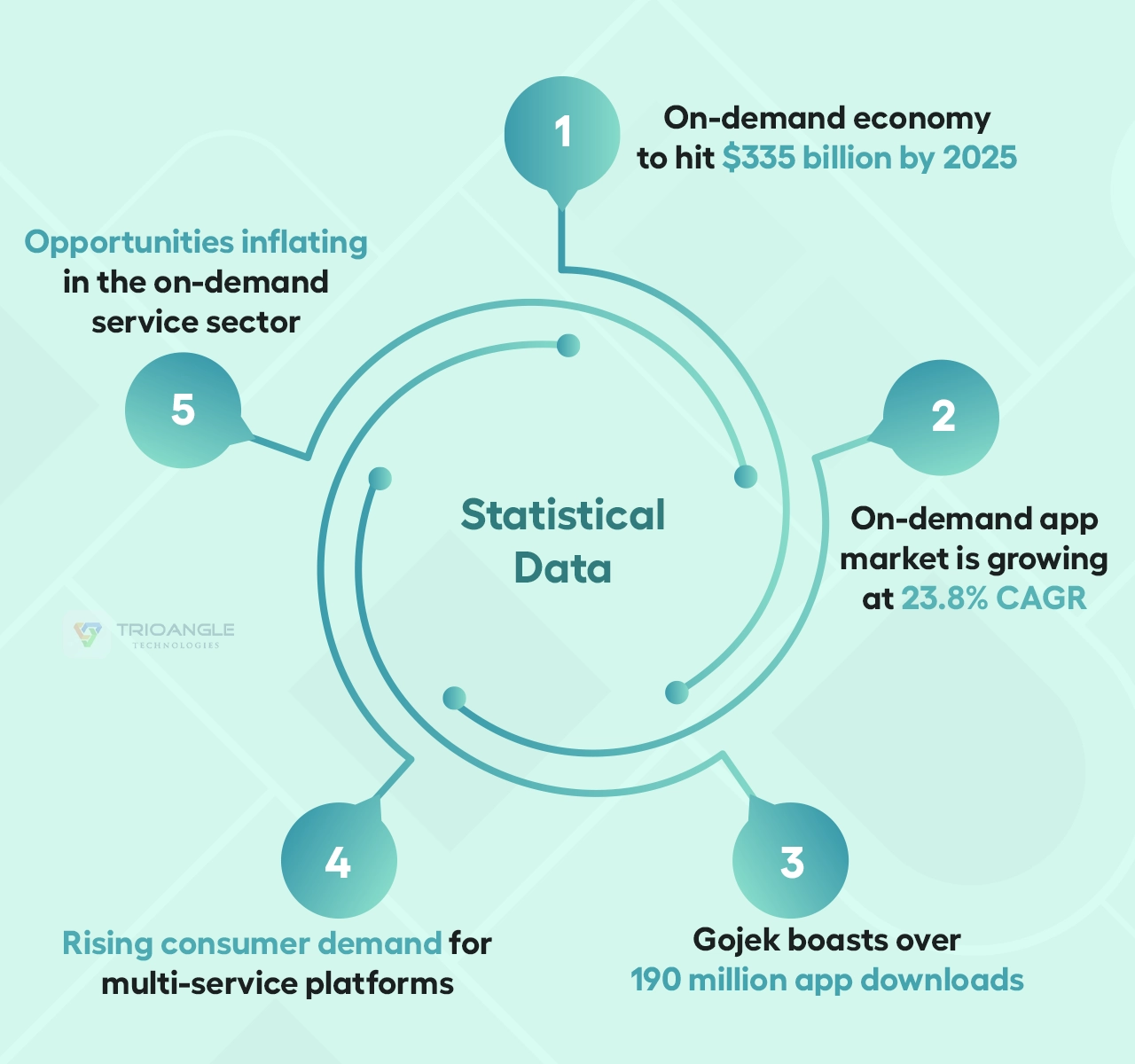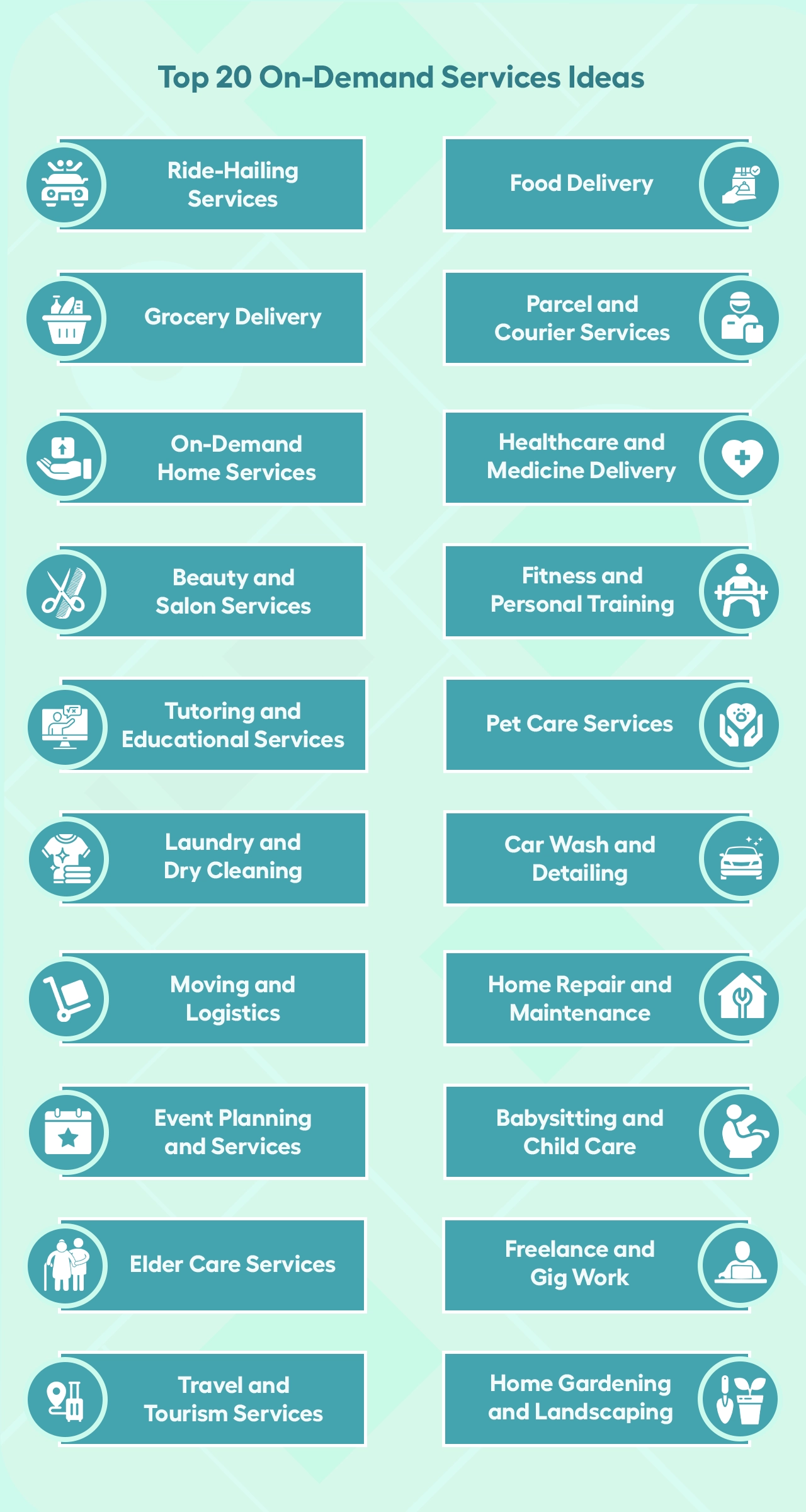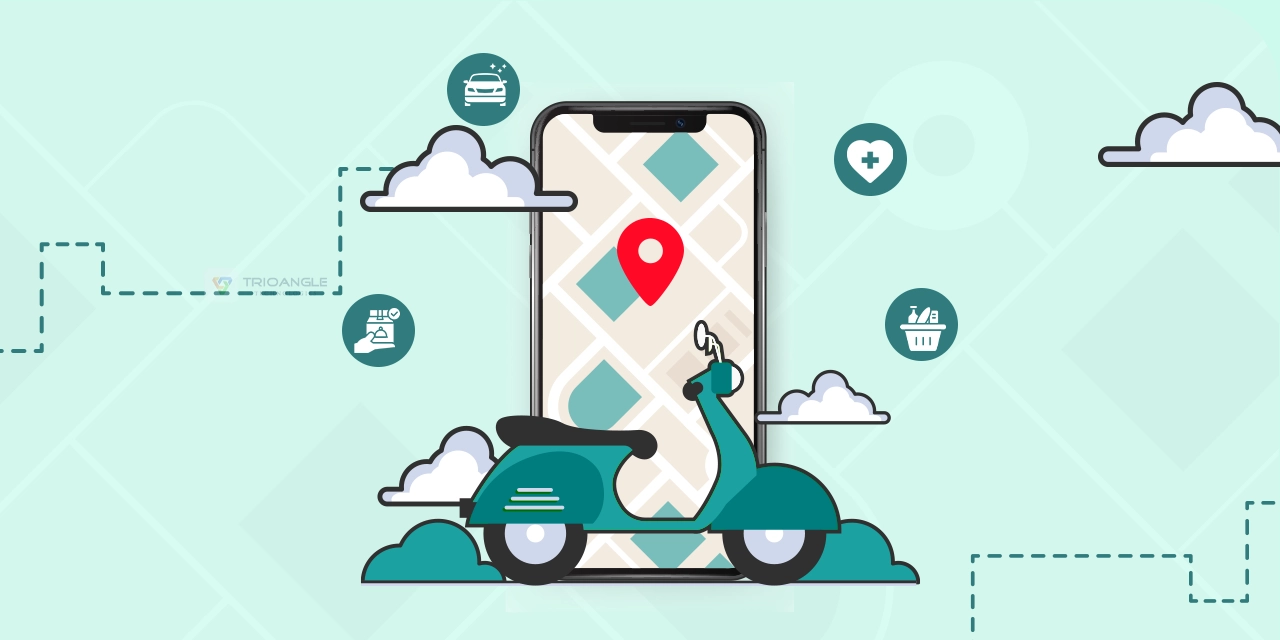In the bustling world of on-demand services, super apps like Gojek have revolutionized the way we access multiple services with just a few taps.
And, the global on-demand economy is expected to reach $335 billion by 2025.
Such a big market, isn’t it?
If you’re looking to replicate Gojek’s success and venture into the thriving on-demand service industry, developing a Gojek clone app script could be your golden ticket.
“With the on-demand economy set to hit $335 billion by 2025, I’d like to put a thought-provoking question for you: What unique service would you bring to life with your own Gojek clone app?” Share your ideas in the comments!
This comprehensive guide covers everything you need to know about creating your Gojek clone app.
Now, let’s dive into the topic!
The Statistical Data of the On-Demand Service Industry
The on-demand service industry has witnessed exponential growth over the past decade. According to recent reports:

- We already know the on-demand economy is skyrocketing, set to reach a staggering $335 billion by 2025. Imagine the possibilities!
- In 2023, the on-demand app market was valued at $112.47 billion and is projected to grow at a CAGR of 23.8% from 2023 to 2028.
- Gojek itself has reported over 190 million app downloads across Southeast Asia, showcasing the massive demand for multi-service platforms.
These statistics underscore the immense potential for Gojek clone apps in the market. As consumer expectations evolve towards convenience and immediacy, the appeal of all-in-one solutions like Gojek continues to soar.
What is the Purpose of Gojek?
Gojek, originating from Indonesia, is a powerhouse in the on-demand service sector, offering a myriad of services ranging from ride-hailing to food delivery and beyond.
Gojek’s impeccable success has sparked interest among entrepreneurs and businesses globally, leading to the rise of Gojek clone app scripts.
What is the Gojek Clone App Script?
A Gojek clone app script is a pre-built software solution designed to mimic the functionality and features of the original Gojek app. It allows businesses to launch a multi-service app quickly and cost-effectively.
This script encompasses various services such as ride-hailing, food delivery, courier services, and more, all integrated into a single platform.
Valid Reasons to Choose a Gojek Clone App
Opting for a Gojek clone app has several advantages:

- Economical Benefits: Developing a Gojek clone app from scratch can be expensive. Using a clone script significantly reduces development costs. Because it leverages pre-existing code and frameworks.
- Enables Quick Market Entry: Pre-built scripts allow for faster deployment, helping businesses launch their services quickly.
- Flexibility in Customization: These scripts are highly customizable, allowing you to customize the app according to your unique business requirements.
- Established Business Model: With a Gojek clone, you’re leveraging a business model that has already proven successful.
Top Reads: Potential Benefits In Gojek Clone Development
Let’s Understand the Business Model of Gojek Clone
Typically, a Gojek clone app follows a multi-service model, offering diverse services under one roof. Here’s a breakdown of how it operates:

Aggregator Model
The app acts as an intermediary between service providers (such as drivers, restaurants, and delivery personnel) and consumers, facilitating transactions and service delivery.
Multi-service Offering
The Gojek clone script integrates various on-demand services like transportation, food delivery, grocery delivery, courier services, and more, providing users with a one-stop solution for their needs.
Customer-centric Approach
Focuses on enhancing user experience through seamless booking, real-time tracking, secure payments, and reliable customer support.
Service Provider Engagement
Attracts and retains service providers through a user-friendly interface, earnings transparency, and opportunities for visibility through the platform.
Revenue Streams
Generates income through commissions on transactions, subscription fees from service providers, in-app advertising, and additional charges for premium services like fast delivery.
Scalability and Expansion
The business model allows for growth by adding new services, expanding into new regions, and adjusting to changes in customer preferences and market trends.
This business model fosters profitability and growth in the competitive on-demand services market.
Steps to Develop a Gojek Clone App
Creating a successful Gojek clone app involves several key steps:

1. Researching and Planning Market Needs
Start by conducting thorough market research to understand the demand for various services in your target region.
Identify your competitors, potential users, and service providers.
Create a comprehensive business plan outlining your goals, target audience, and revenue model.
2. Selecting the Optimal Tech Stack
Selecting the appropriate technology stack is crucial for app performance and scalability. Typically, a Gojek clone app would include:
- Frontend: React Native, Flutter, or Swift for iOS and Java/Kotlin for Android.
- Backend: Node.js, Python, or Ruby on Rails.
- Database: MongoDB, PostgreSQL, or MySQL.
- Real-Time Communication: Socket.IO or Firebase.
3. Crafting User-Centered Design (UI/UX)
Focus on creating a user-friendly interface with intuitive navigation. Ensure that the design is responsive, appealing, and provides a seamless user experience.
4. Building the Gojek Clone App
Start the development process by building the customer, service provider, and admin panels. Ensure that all functionalities are well-integrated and the app performs smoothly across different devices.
5. Thoroughly Testing the Gojek Clone App
Conduct rigorous testing to identify and fix bugs. Test the app under various scenarios to ensure it handles real-world use cases efficiently.
6. Deploying the Gojek Clone App
Once testing is complete, deploy the app on the respective platforms (App Store, Google Play). Ensure that your servers are well-configured to handle traffic.
7. Promoting and Launching Your Gojek Clone
Develop a robust marketing strategy to promote your app.
To effectively reach your target audience, utilize:
- Digital Marketing
- Social media
- Local advertising
Plan an impactful launch to attract initial users and service providers.
8. Post-launch Support and Maintenance
After the launch, provide ongoing support to address any issues users may face. Regularly update the app with new features and improvements based on user feedback.
These are the steps to follow to successfully develop your Gojek clone app script. Let’s see what are on-demand services to include in your multi-service business.
Top 20 On-Demand Services Ideas for Your Gojek Clone App Script

1. Ride-Hailing Services With Gojek Clone
Provide users with convenient access to taxis, car rentals, or bike rides for quick and easy transportation.
2. Food Delivery
Enable users to order food from local restaurants and have it delivered straight to their doorstep.
3. Grocery Delivery
Allow customers to shop for groceries online and get them delivered within hours.
4. Parcel and Courier Services
Offer quick and reliable delivery of parcels and packages locally or across cities.
5. On-Demand Home Services
Connect users with professionals for tasks like cleaning, plumbing, electrical work, and handyman services.
6. Healthcare and Medicine Delivery
Provide delivery of prescription medications and connect users with on-demand doctors or telehealth services.
7. Beauty and Salon Services
Bring beauty treatments like hairstyling, makeup, and spa services directly to users’ homes.
8. Fitness and Personal Training
Offer access to personal trainers or fitness instructors who provide on-demand workouts at home or virtually.
9. On-Demand Tutoring and Educational Services
Connect users with tutors for academic subjects or skills training, available on demand.
10. Pet Care Services With Gojek Clone
Provide on-demand pet grooming, pet sitting, walking, and veterinary services.
11. Laundry and Dry Cleaning
Enable users to schedule pickup and delivery for laundry and dry cleaning services.
12. Car Wash and Detailing
Offer mobile car wash and detailing services that come to the user’s location.
13. Moving and Logistics
Facilitate on-demand moving services, including trucks and labor for relocating or transporting goods.
14. Home Repair and Maintenance
Provide quick access to professionals for home repairs, maintenance, and renovation services.
15. Event Planning and Services
Connect users with on-demand event planners, caterers, photographers, and entertainers.
16. Babysitting and Child Care
Offer trusted babysitting and child care services available on demand.
17. Elder Care Services With Gojek Clone
Provide on-demand assistance and care for the elderly, including companionship and medical support.
18. Freelance and Gig Work
Create a platform for hiring freelancers for various tasks like graphic design, writing, or coding.
19. Travel and Tourism Services
Provide on-demand travel guides, tour bookings, and local experiences for travelers.
20. Home Gardening and Landscaping
Offer on-demand gardening, lawn care, and landscaping services to help users maintain and beautify their outdoor spaces.
These services can be added to a Gojek clone app to create a versatile platform that meets various user needs.
Conclusion: Develop Your Gojek Clone App Now!
Creating a Gojek clone app is a fantastic way to enter the growing on-demand service market. By combining multiple services into one app, you can meet many customer needs all at once.
This guide covered everything from understanding the business model to choosing the right tech stack and highlighting the top services to include.
With careful planning, great design, and solid execution, your Gojek clone app can succeed and grow.
Ready to start your journey?
The possibilities are endless!
Ready to Ride the Wave of On-demand Services?








